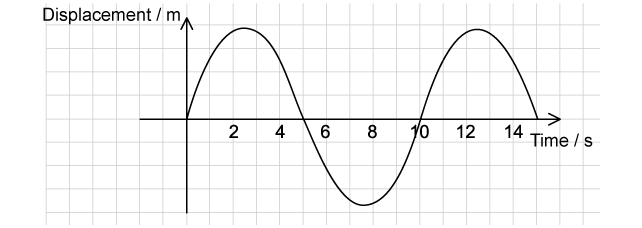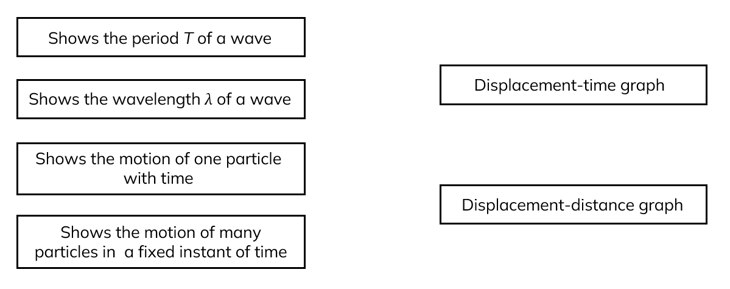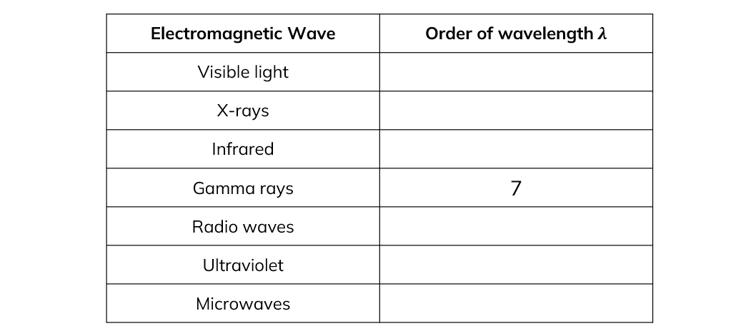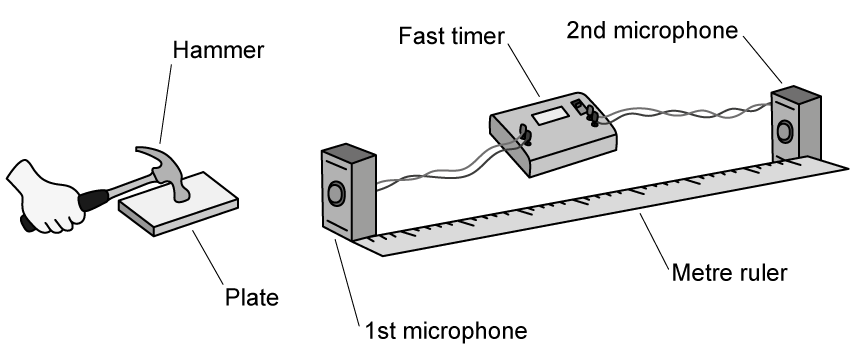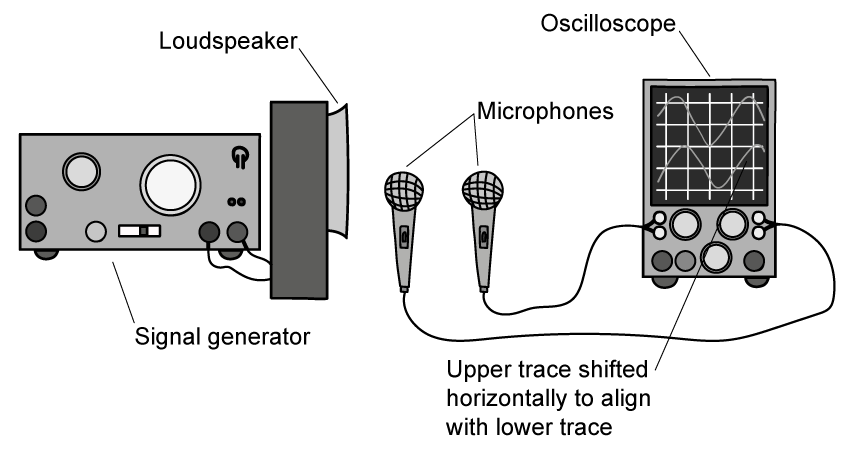The displacement-distance graph shows a travelling wave.
(a)
Label the diagram with the correct wave features
[2]
Assess your score
View Answer
(b)
Match the key word to its correct definition
[5]
Assess your score
View Answer
The diagram shows a displacement-time graph for an oscillating object.
(c)
Determine the time period T for this oscillation
Assess your score
View Answer
The oscillation shown in part (c) has a wavelength λ of 5 m.
(d)
Calculate:
(i)
The frequency f of the oscillation
[2]
(ii)
The wave speed c
[2]
Assess your score
View Answer
Next Question
(a)
Complete the following sentences by circling the correct words:
In a transverse / longitudinal wave the oscillations are perpendicular to the direction energy transfer.
In a transverse / longitudinal wave the oscillations are parallel to the direction energy transfer.
Transverse / Longitudinal waves do not require a medium through which to propagate.
A rarefaction is an area of high / low pressure in transverse / longitudinal waves.
Radio waves and the vibrations on a guitar string are examples of transverse / longitudinal waves.
Sound travelling through air is an example of a transverse / longitudinal wave.
[6]
Assess your score
View Answer
The diagram shows a longitudinal wave.
(b)
Mark on the diagram one complete wavelength and label it λ
[1]
Assess your score
View Answer
The diagram shows a longitudinal wave.
(c)
Choose suitable words and phrases to complete the sentences.
Label A indicates a ___________. This is an area of _______ pressure where the particles are ______________________.
Label B indicates a ____________. This is an area of ________ pressure where the particles are __________________.
The particles oscillate __________________________. The direction of motion and energy transfer is _______________________________.
[6]
Assess your score
View Answer
(d)
Draw a line for each statement to identify whether it refers to a displacement-distance graph or a displacement-time graph.
[4]
Assess your score
View Answer
Previous Question Next Question
(a)
State the speed of microwaves in a vacuum.
[1]
Assess your score
View Answer
(b)
Calculate the frequency f of an infrared wave with a wavelength λ = 2.5 × 10−6 m s−1 .
[2]
Assess your score
View Answer
(c)
Order the electromagnetic waves by wavelength λ. Write a number from 1 to 7 in the column with 1 being the longest wavelength and 7 being the shortest wavelength.
[3]
Assess your score
View Answer
(d)
State the longest and shortest wavelengths λ for visible light.
[2]
Assess your score
View Answer
Previous Question Next Question
(a)
Define a longitudinal wave.
[1]
Assess your score
View Answer
(b)
Define a transverse wave.
[1]
Assess your score
View Answer
(c)
Give three examples of transverse waves.
[3]
Assess your score
View Answer
(d)
State an electromagnetic wave with a frequency higher than visible light.
[1]
Assess your score
View Answer
Previous Question Next Question
(a)
State the lowest and highest frequencies that are detectable to the human ear.
[2]
Assess your score
View Answer
(b)
Complete the following sentences by adding the correct words into the gaps:
The frequency of a sound wave is related to its _______. Sounds with a _______ frequency have a high _______. Sounds with a ______ frequency have a low ________.
The amplitude of a sound wave is related to its _______. Sounds with a ________ amplitude have a high _______. Sounds with a _______ amplitude have a low ________.
[6]
Assess your score
View Answer
A fast timer was used to measure the time taken for a sound to travel between two microphones.
The microphones were placed 80 cm apart. The mean time interval was 2.5 ms.
(c)
Calculate the speed of the sound
[4]
Assess your score
View Answer
A signal generator was set to produce a sound wave at 1 kHz. Two microphones detect the sound and show the traces on a double beam oscilloscope.
The second microphone was moved away from the first microphone until the oscilloscope traces aligned. The distance between the microphones at this point showed that the wavelength of the sound wave was 3.4 cm.
(d)
Calculate the speed of the sound
[3]
Assess your score
View Answer
Previous Question

